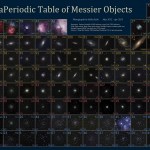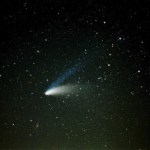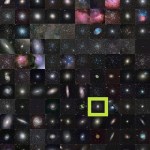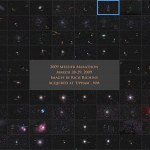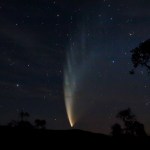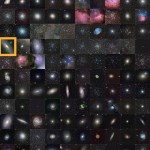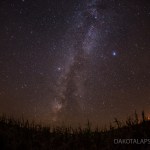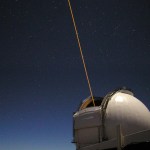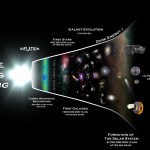Hubble
"Some say the world will end in fire,
Some say in ice.
From what I've tasted of desire
I hold with those who favor fire.
But if it had to perish twice,
I think I know enough of hate
To say that for destruction ice
Is also great
And would suffice." -Robert Frost
Depending on where you are in the world right now, you might really be feeling the effects of the emerging winter, as cold snaps, freezes and snowstorms take hold across the northern hemisphere.
Image credit: NASA's Scientific Visualization Studio, Goddard Space Flight Center.
But we can all be pretty sure that this is temporary,…
"Anyone who keeps the ability to see beauty never grows old." -Franz Kafka
The night sky is our window into the Universe beyond the Solar System, and in some cases, even beyond our own galaxy! Perhaps the oldest useful collection of deep-sky objects, the Messier catalogue showcases 110 of the most prominent night sky wonders, a full 42 of which are located beyond our own galaxy. Today, for Messier Monday, let's take a look at one of the true rarities of the Messier catalogue: a globular cluster that's not a part of our own galaxy!
Image credit: Al Kelly of http://www.kellysky.net/;…
"Dream no small dreams, for they have no power to move the hearts of men." -Johann Wolfgang von Goethe
Welcome back to yet another Messier Monday here on Starts With A Bang! Each Monday, we highlight one of the 110 deep-sky objects that make up the Messier catalogue, showing you where and how to find it in the sky and telling you a bit about the history and the physics/astrophysics behind it. Each one tells its own unique story, and today's distant wonder is no exception.
Image credit: Rich Richins, of all 110 Messier objects (in no particular order).
On a virtually moonless night like…
"I should like to lie at your feet and die in your arms." -Voltaire
Every object that we look at for Messier Monday has its own flavor, its own qualities, and its own unique characteristics. By far the most numerous of the 110 deep-sky objects making up the Messier catalogue are the galaxies, of which there are 40. It's best to observe them on moonless nights, as their surface brightness is spread out across a large area, and even a crescent Moon's presence in the night sky can make all but the brightest of these galaxies invisible to the eye, even in good equipment.
Image…
"I have just gone over my comet computations again, and it is humiliating to perceive how very little more I know than I did seven years ago when I first did this kind of work." -Maria Mitchell
Well, it's getting close to the end of October, the Moon is waning towards its new phase, and -- at least in the northern hemisphere -- the days are getting shorter and the nights are lengthening. Is there anything unique on its way that's worth watching the skies for? In today's Ask Ethan column, our suggestion comes from longtime reader and commenter Sinisa Lazarek, who inquires:
Since ISON …
"The battle, sir, is not to the strong alone; it is to the vigilant, the active, the brave." -Patrick Henry
It's not a good idea to showcase a galaxy for you every Messier Monday, considering that even a crescent Moon can render most of them completely unobservable. Now that the autumnal equinox has passed, however, a very special spiral will be visible after sunset for the next six months or so in a relatively nondescript part of the night sky. Out of the 110 deep-sky objects that comprise the Messier catalogue, a full forty of them are galaxies, although today's object wasn't…
"I would rather have one article a day of this sort; and these ten or twenty lines might readily represent a whole day's hard work in the way of concentrated, intense thinking and revision, polish of style, weighing of words." -Joseph Pulitzer
When it comes to the Messier objects, though, it isn't words that get concentrated; its collections of stars, gas, dust and more! So welcome to another edition of Messier Monday, where we take an in-depth look at one of the 110 deep-sky objects that make up the Messier catalogue. Some of these objects are only a few light-years wide,…
"Observations indicate that the universe is expanding at an ever increasing rate. It will expand forever, getting emptier and darker." -Stephen Hawking
Today's Ask Ethan comes to us via our question/suggestion box from reader MIUFish, who asks:
I read something recently about some people who were doing work looking at the possibility that the mass of things has been decreasing, as an alternate explanation - or, perhaps, interpretation - to some of the questions regarding the expansion of the universe and so on.
Is there any seriousness to this? Do you know anything about it?
Here's…
"Now, this is not the end. It is not even the beginning of the end. But it is, perhaps, the end of the beginning." -Winston Churchill
To kick off every week for nearly a year now, we've begun it with Messier Monday, where we take an in-depth look at the 110 deep-sky objects that make up the first elaborate catalogue of fixed night-sky wonders that could possibly be confused for transient comets. Originally, when first published, this catalogue was made up of 103 objects; the final 7 were added posthumously. Each one tells its own unique story, yet all of them tell a sliver of our own…
"The great oak of Astronomy has been felled, and we are lost without its shadow." -Subrahmanyan Chandrasekhar, on the passing of Jan Oort
In our new semi-regular series, readers from all over the world (and in low-Earth orbit, too, because why not!) are invited to send in their questions and suggestions for a chance to have them answered here on this blog! Today, our question comes from Robert Meegan, who asks,
Have any Oort Cloud objects been detected in situ, as opposed to when they whipped through the inner solar system as comets? I would presume that any detection would…
"One sees qualities at a distance and defects at close range." -Victor Hugo
A couple of weeks ago we took a look at the most distant galaxy (so far) in the known Universe, a galaxy so far away that it takes exclusively infrared observations from our most power space telescopes (Hubble and Spitzer) in order to detect it. What's perhaps even more remarkable is that the light we do detect from it -- the light we detected in the infrared -- was actually emitted in the Ultraviolet part of the spectrum!
Image credit: NASA, ESA, Garth Illingworth (University of California, Santa Cruz) and…
"We find them smaller and fainter, in constantly increasing numbers, and we know that we are reaching into space, farther and farther, until, with the faintest nebulae that can be detected with the greatest telescopes, we arrive at the frontier of the known universe." -Edwin Powell Hubble
With 110 deep-sky objects scattered throughout the heavens, the Messier Catalogue provides skywatchers across the globe with a number of spectacular targets, from nearby nebulae and clusters to spectacular, distant galaxies. Each Monday, we spotlight a new one right here.
Image credit: Rolando Ligustri,…
“People say sometimes that Beauty is superficial. That may be so. But at least it is not so superficial as Thought is. To me, Beauty is the wonder of wonders. It is only shallow people who do not judge by appearances. The true mystery of the world is the visible, not the invisible.” -Oscar Wilde
Beyond the planet Earth, beyond all the stars in the night sky, and beyond the Milky Way galaxy, there's literally an entire Universe out there.
Image credit: R. Jay GaBany, of http://cosmotography.com/.
The farther away we're able to look, the more galaxies we're able to see. As far as our…
"On a cosmic scale, our life is insignificant, yet this brief period when we appear in the world is the time in which all meaningful questions arise." -Paul Ricoeur
Ask anyone who's looked up at a dark sky on a clear, moonless night, and you'll immediately hear tales about how incomprehensibly vast the Universe is.
Image credit: Randy Halverson, flickr user dakotalapse, from http://dakotalapse.com/.
But what you're looking at isn't much of the Universe at all. In fact, practically every point of light you see, including the vast swath of stars too dim to individually resolve, comes…
"But certainly the laser proved to be what I realized it was going to be. At that moment in my life I was too ignorant in business law to be able to do it right, and if I did it over again probably the same damn thing would happen." -Gordon Gould, inventor of the laser
You're used to the iconic image of an observatory's dome surrounded by a dark sky. From within, a telescope peers up at the heavens. And with a huge amount of light-gathering power that dwarfs a fully dilated human eye, we can use this tremendous tool to peek into the dark depths of the Universe.
Image credit: Fort Lewis…
"Most writers spend their lives standing a little apart from the crowd, watching and listening and hoping to catch that tiny hint of despair, that sliver of malice, that makes them think, 'Aha, here is the story.'" -Ayelet Waldman
Welcome back again to another Messier Monday, where we're all set to take an in-depth look at one of the 110 deep-sky wonders that make up the Messier catalogue. Looking at the nearby stellar remnants, star-forming regions and young star clusters, as well as the more distant and larger globular clusters, the most common of all the Messier objects are also…
"It's a wonderful world. You can't go backwards. You're always moving forward. It's the wonderful part about life. And that's terrific." -Harvey Fierstein
Yes, it's true. As stationary and secure as it seems when you plant your feet firmly on the ground, the reality is we are always moving through the cosmos.
Image credit: H.A. Rey, via Samuel J. Wormley of http://www.edu-observatory.org/.
About its axis, the Earth spins around once per day. Unless you're at the exact north or south pole of the planet, that means that you are in motion, too! The fastest-moving among us are located at…
"Yes, indeed, if humankind — from humble farmers in the fields and toiling workers in the cities to teachers, people of independent means, those who have reached the pinnacle of fame or fortune, even the most frivolous of society women — if they knew what profound inner pleasure await those who gaze at the heavens, then France, nay, the whole of Europe, would be covered with telescopes instead of bayonets, thereby promoting universal happiness and peace." -Camille Flammarion
Welcome back to Messier Monday here on Starts With A Bang, where each Monday we take a detailed look at one of the…
"Why I came here, I know not; where I shall go it is useless to inquire - in the midst of myriads of the living and the dead worlds, stars, systems, infinity, why should I be anxious about an atom?" -Lord Byron
Welcome back to another Messier Monday here on Starts With a Bang! Messier's 18th-Century catalogue of 110 deep-sky objects that could potentially be confused with comets by skywatchers has endured as one of the greatest collections of deep-sky objects clearly visible to amateur and professional astronomers worldwide!
Image credit: ScienceSouth - Tony's Astronomy Corner, via http://…
"Much later, when I discussed the problem with Einstein, he remarked that the introduction of the cosmological term was the biggest blunder he ever made in his life. But this “blunder,” rejected by Einstein, is still sometimes used by cosmologists even today, and the cosmological constant denoted by the Greek letter Λ rears its ugly head again and again and again." -George Gamow, the father of the Big Bang model
The Big Bang -- the prediction that the Universe started from a hot, dense, rapidly expanding state -- tells us where our cold, star-and-galaxy-rich, slowly expanding Universe full of…



